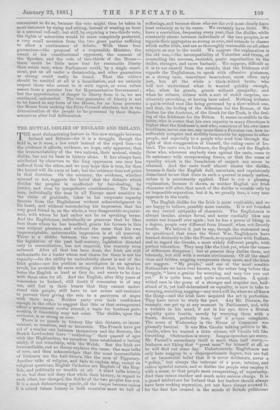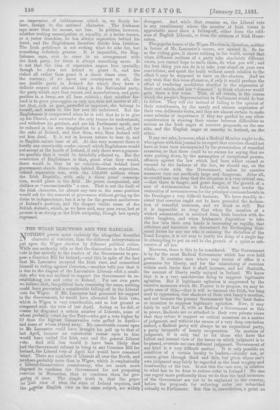THE MUTUAL DISLIKE OF ENGLAND AND IRELAND.
THE most disheartening feature in this now struggle between Ireland and Britain—for it is a struggle, though the field is, as it were, a law court instead of the roped lists—is the evidence it affords, evidence, we hope, only apparent, that the irreconcilability of the two nations, their mutual, steady dislike, has not its basis in history alone. It has always been attributed by observers to the long oppression one race has suffered from the other, and we may hope this is true, for then the hatred will die away at last ; but the evidence does not point in that direction. On the contrary, the evidence, whether misread or not, suggests the belief that the distaste which divides the peoples is unaffected by fair-dealing, by justice, and even by sympathetic consideration. The Irish- man, individually the man in all Europe most sensitive to the claim of gratitude, takes in his corporate capacity favours from the Englishman without acknowledgment in his heart, and without surrendering his impression that his very good friend is, on the whole, a very disagreeable acquaint- ance, with whom he had rather not be on speaking terms. And the Englishman, individually so generous that he likes best those whom he has benefited, grants his favours in this case without pleasure, and without the sense that his own imprescriptable, unfavourable impression is at all removed. There is a dislike between the two peoples which all the legislation of the past half-century, legislation directed only to reconciliation, has not removed, has scarcely even softened. After all that has been done, the Irish are still enthusiastic for a leader whose real charm for them is not his capacity—for the ability he undoubtedly shows is not of the Irish grain—nor his position as mouthpiece in an agrarian revolt, for avowedly te cares nothing about that, but that he hates the English as hard as they do, and wants to be done with them once for all. And the English, after fifty years of concession to Ireland, still doubt if concession is of any use, still feel in their hearts that they cannot under- stand this people, still have to use severe self-restraint to prevent their giving the rein to a paroxysm of anger with their ways. Neither party ever feels confidence enough in the other to suggest that this or that arrangement offers a permanent modus vivendi, a basis for business part- nership, if friendship may not exist. The dislike, upon the evidence, is as strong as ever.
There is no puzzle in history like this distaste, so incon- venient, so senseless, and so incurable. The French have got rid of a similar one between themselves and the Bretons, the Scotch Lowlanders have " redded-up " their quarrel of ages with the Highlanders, we ourselves have established a lasting amity, if not friendship, with the Welsh. But the Irish are irreconcilable, and no theory explains the cause. One man talks of race, and then acknowledges that the most irreconcilable of Irishmen are the half-bloods, like the men of Tipperary. Another talks of religion, and fails to explain why, except on religious questions, English Catholics are English of the Eng- lish, and politically no trouble at all. A third talks history to us, but does not deny that while their history, in regard to each other, has changed, the dislike of the two peoples has not. It is a most disheartening puzzle, all the deeper because unless it is solved future history in both countries must be full of sufferings, and because those who see the evil most clearly have least certainty as to its cause. We certainly have little. We have a conviction, deepening every year, that the dislike, while constantly absent between individuals of the two peoples, is as regards their aggregates as strong as ever, and extends to classes which suffer little, and are as thoroughly reasonable on all other subjects as any in the world. We suppose the explanation is the old one,—the incompatibility of Valentine and Orson, of reconciling the nervous, excitable, poetic organisation to the duller, stronger, and more barbaric. We suppose, difficult as it is to see oneself from the outside, that the Irishman still regards the Englishman, to speak with offensive plainness, as a strong man, sometimes benevolent, more often only just, but all the while a thick-witted brute, who will not understand what is wanted quickly enough, who, when he grants, grants without sympathy, and when he refuses, refuses with a sort of stolid surprise, un- utterably provoking, at having been asked. Nothing irritates a quick-witted race like being governed by a slow-witted one, and that, the feeling of the Athenian for the Roman, of the Italian for the Austrian, of the Greek for the Turk, is the feel- ing of the Irishman for the Briton. It seems incredible to the latter, who is aware that his own capacity in many directions is higher than the Irishman's, and who, conscious of his own inner kindliness, never can see, any more than a Prussian can, how in- sufferably arrogant and stolidly immovable ho appears to other people, and especially to a people who read him through the light of that exaggeration of himself, the ruling caste of Ire- land. The caste are, to Irishmen, the English ; and the English. those who, whenever anybody rises against the caste, come to its assistance with overpowering forces, so that the sense of equality which is the foundation of respect can never be attained. And the caste itself almost shares the dislike, because it finds the English dull, uncertain, and capriciously disinclined to see that force in such a quarrel is nearly useless, unless it is persistently applied. That is not a pleasing explanation, because it shows, as neither English nor Irish character will alter, that much of the dislike is curable only by an impossible separation, but it is, we greatly fear, a very near approach to the truth.
The English dislike for the Irish is more explicable, and we are happy to believe, possibly more curable. It is not founded on any rooted antipathy of character. The Englishman is always insular, always borne, and never cordially likes any nation not himself over again ; but he has a power of liking, in a degree, people very different from himself, when not directly hostile. We believe it just to say, though the statement may be questioned, that since the Great War, Englishmen have learned distinctly to like the French, to sympathise with Italians, and to regard the Greeks, a most widely different people, with perfect toleration. They may like the Irish yet, when the causes of difference disappear ; but at present they dislike them, not intensely, but still with a certain obviousness. Of all the small vices and foibles, nagging exasperates them most, and the Irish are naggers. " My people," said one of the most sensible Nationalists we have ever known, to the writer long before this struggle, " have a genius for worrying, and may tire you out yet.'' It is quite true, and quite natural, besides. A quick- witted race in the grasp of a stronger and stupider one, half- afraid of it, yet half-determined on equality, is sure to take to worrying, worriting, nagging—any word will do, when we all know the thing—and the Irish have acquired the art in perfection. They have never to study the part. Any Mr. Dawson, for example, can get up at any moment in Parliament, and, with a twinkle in his mind, if not in his eye, drive a British majority quite frantic, merely by worrying them with a fluent, decent, perfectly true, mal a propos complaint. The scone of Wednesday in the House of Commons was gloomily farcical. It was Mrs. Caudle talking politics to Mr. Caudle, when he wanted a little silence, till Caudle felt like throttling. Obstruction is worry. League speeches are worry. Mr. Parnell's ascendancy itself is more than half worry,— Irishmen not liking that " great .man" for himself at all, as he will find out some day. Unfortunately, Englishmen not only hate nagging to a disproportionate degree, but are full of an immovable belief that it is never deliberate, never a " policy," but always the outcome of a poor, inferior, and rather spiteful nature, and so dislike the people who employ it with a sense, to that people most exasperating, of superiority. And then comes another and much more serious charge. It is a grand misfortune for Ireland that her leaders should always have been seeking separation, yet not have always avowed it, for the fact has created in the minds of British politicians
an impression of faithlessness which is, we firmly be- lieve, foreign to the national character. The Irishman says more than he means, not less. In politics,. however, whether seeking emancipation or equality, or a better tenure, or a juster franchise, he has always separation behind his hand, and the Englishman therefore thinks him faithless. The Irish petitioner is not seeking what he asks for, but
something infinitely greater. It is impossible, the Eng- lishman says, ever to come to an arrangement with the Irish party, for there is always something more. It is not that the idea of separation angers him specially, though he does not intend to grant it, and has
risked all rather than grant it a dozen times over. On the contrary, if we know our countrymen at all, the one hostile party in Ireland for which they have a definite respect and almost liking is the Nationalist party, the party which says that tenure, and manufactures, and pros- perities in a lump, are all base rubbish ; that whether Ire- land is to grow pine-apples or only rye, does not matter at all ; but that, rich or poor, powerful or impotent, she belongs to herself, and wants to live her own life unfettered. But the Englishman is exasperated when he is told that he is to give up his Church, and surrender the only tenure he Understands; and withdraw his garrison, and see his Parliament spoilt, and be reduced in his own imagination to a lower level, all for the sake of Ireland, and that then, why, Then Ireland will cut him dead. It is not in human nature to bear it, and in English nature least of all, At this very moment there is hardly any conceivable 'nodes rivencli which Englishmen would not accept at the hands of Ireland, if only there were a guaran- tee possible that it would be faithfully adhered to. But the conviction of Englishmen is that, grant what they would, there would in that be no solution—that behind local government stands Homo-rule, behind Home-rule separation, behind separation war, with the 150,000 soldiers whom the Irish Republic, with only a three years' conscrip- tion, would place in the field. He grows exasperated, and dislikes so " unconscionable " a race. That is not the fault of the Irish character, for almost any race in the same position would ask for the removal of grievances without giving up the claim to independence ; but it is by far the greatest misfortune of Ireland's position, and the deepest visible cause of the British distaste, which, as we have said, may pass away, but at present is as strong as the Irish antipathy, though less openly expressed.



































 Previous page
Previous page